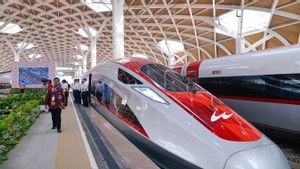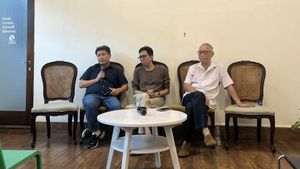JAKARTA - In the last few days, President Joko Widodo (Jokowi) 's invitation to hate foreign products has become a hot topic. Jokowi is furious at the fraudulent practices of foreign traders who slam prices on e-commerce platforms that threaten Micro, Small and Medium Enterprises (MSMEs) businesses. You could say the problem known as predatory pricing is systemic, because the problem is not only with foreign sellers and imported products, but also on the e-commerce platform itself. And unfortunately, our regulations are not ready to fix all of that.
The hashtag of the movement to save MSMEs has resounded on Twitter's timeline. previously netizens were busy discussing the hashtag #SellerAsingB KillUMKM. Yesterday, the hashtag was more specific, #BerantasPredatoryPricing.
At first this polemic was triggered by the presence of a foreign seller who was nicknamed Mr HU from China. The seller sells products imported directly from abroad at a lower price than similar products sold by domestic sellers.
"If there is a digital trade practice that behaves unfairly to MSMEs, it must be regulated immediately and must be resolved immediately. Just last week I told the Minister of Trade, there is something wrong in our digital trade. Killing MSMEs, be warned," said President Jokowi , when inaugurating the opening of the national working meeting of the Ministry of Trade at the State Palace, Jakarta, Thursday, February 4.
Furthermore, Jokowi said that all parties must defend, protect, and empower MSMEs to advance in class. Therefore, the national movement to love local products must be stimulated.
"The call to love our own products must continue to be echoed. Domestic products are echoed. Echo also hate foreign products. Not only love, but hate. Love our goods, hate foreign products," he explained.

President of the Republic of Indonesia, Joko Widodo. (Photo: Doc. Setkab)
The e-commerce business does have a significant contribution to the Indonesian economy. In 2018 alone, Bank Indonesia recorded that the value of transactions in the online trading business reached more than IDR 77 trillion. This figure is the result of the rapid increase in e-commerce transactions the previous year by 151 percent.
McKinsey & Company in its report has an idea of how fantastic the value of the e-commerce business is. They project that by 2022 the value of e-commerce transactions will skyrocket more than eight times to reach IDR 778-920 trillion.
That's just from the cuan side. In terms of employment, the impact is also extraordinary. E-commerce is able to absorb 4 million workers and is expected to increase to around 26 million by 2022.
However, despite its large contribution, e-commerce in Indonesia is not without challenges. We interviewed Irfan, a local trader of masks and pants at one of the largest e-commerce sites in Indonesia.
Irfan, who has been selling online in e-commerce for about a year, admitted that at first he could indeed make big money there. In the first four months he was selling, no less than 500 items were sold out per day. However, after that its sales collapsed when similar imported goods suddenly emerged as competitors.
"Suddenly there are many imported products selling similar but cheaper goods. Previously, 500+ pcs per day suddenly turned out to be dozens of pieces," said Irfan to VOI.
He complained that his rival, a seller of imported medical masks, had slammed prices too much. "And pants too, imported medical masks also cost a lot. When imported goods came in like medical masks, local masks began to decrease in demand," he said.
Irfan is not the only seller who feels the cruelty of slashing price competition. In a survey by the Indonesian Institute of Sciences (LIPI) of 806 online sellers and 820 online buyers, 87.6 percent felt that price competition was intense. 54.8 percent of these traders also admitted to be competing with branded products and 44.8 percent found it difficult to compete with imported products.

According to data from the Ministry of Industry quoted by the LIPI survey in 2019, 90 percent of the products sold in Indonesian e-commerce are imported goods. This condition is a big obstacle for domestic producers, especially MSMEs.
In the report, LIPI said that one of the largest sources of imported goods came from China. In Indonesia, there are at least three large marketplaces that provide facilities for sellers from Panda Country to peddle their goods. For example Lazada, which has a special platform that allows consumers to shop directly from China's largest e-commerce, Taobao.
Similar facilities are also provided by Shopee with its global platform and JD.ID in collaboration with Jingdong. In addition, the marketplace owned by BUMN Blanja.com also facilitates Indonesian buyers to shop at the marketplace from the United States (US), E-Bay.
Not only that, even without the facilities from the Indonesian marketplace, Indonesian consumers can import foreign products directly from foreign e-commerce platforms. For example, AliExpress, Taobao, and Banggood from China, Amazon and E-Bay from the US, Rakuten from Japan, and several e-commerce platforms from other countries.
Still according to the LIPI survey, there are at least two factors why product imports via e-commerce are so fast. First is because the product does not exist or is scarce domestically, the second is because imported goods are cheaper.
Predatory pricing is an iceberg phenomenonResearcher at the Center of Innovation and Digital Economy Institute for Developments of Economic and Finance (Indef) Media Wahyudi Askar sees predatory pricing as just one of a series of problems that exist in e-commerce that can threaten MSMEs. According to him, the big problem of e-commerce is when the e-commerce platform also acts as a competitor in the platform.
Because, the media said the scheme could lead to unfair trade and create conflicts of interest. "Where platform providers including investors and entities in it are also business people on the platform and become competitors for other business people," he said when contacted by VOI.
According to Media, the ownership structure of the Indonesian e-commerce giant, which comes from foreign investors, also has an interest in selling its merchandise. "This has led to predatory pricing so that it has hit the MSME sector."
Slowing prices or predatory pricing according to New Media is one of the many problems in e-commerce. For example, the question of using data and e-commerce algorithms to analyze consumer behavior is not disclosed to other traders. Not to mention about the various exclusive agreements made by e-commerce and massive discounts.
Therefore, "MSMEs are clearly difficult to compete, because of the potential for discrimination and bias in the ranking of products being sold ... Currently, imported products are not competing with MSMEs, but rather, competing with other imported products. the e-commerce market, "said Media.
Unfortunately, according to the Media, in terms of regulations, Indonesia is not ready to overcome this. In fact, to be able to support MSME products, there needs to be regulations from upstream to downstream.
Regarding e-commerce regulations, the issue of imported products and MSMEs, according to the media, must be based on sectors. Regarding predatory pricing, especially in the food and beverage sector, as well as furniture and textile commodities, said the Media should be prohibited.
"Because most of this sector is dominated by local products and SMEs. KPPU must investigate predatory pricing practices in the form of massive discounts on e-commerce products and ensure justice for every market player. The regulations made must contain a clear punishment mechanism for the perpetrators. businesses that carry out predatory pricing, "he said.
In addition, other regulations that need to be regulated are related to increasing access to capital, regulations related to market access, to regulations that encourage support in the form of assistance. "Other interventions from regulation can also be done in the form of incentives for local e-commerce products, especially with training-based interventions, providing access and special shelters, as well as building a triple helix-based MSME business collaboration," he concluded.
BERNAS OthersThe English, Chinese, Japanese, Arabic, and French versions are automatically generated by the AI. So there may still be inaccuracies in translating, please always see Indonesian as our main language. (system supported by DigitalSiber.id)









